| | | | | | | Presented By Blockchain.com | | | | Axios World | | By Dave Lawler ·Apr 29, 2021 | | Welcome back to Axios World. - Tonight (1,461 words, 5 minutes) we're doing something different. We'll be back to normal programming Monday.
- Heads up: Join Axios' Hans Nichols and Alayna Treene tomorrow at 12:30pm ET for a discussion on President Biden's first 100 days in office. Guests are Sen. John Hickenlooper (D-Colo.) and Rep. Steve Scalise (R-La.) Register here.
Two years ago, the Venezuelan opposition tried and failed to topple Nicolás Maduro. Axios spoke with key figures involved in the uprising and witnesses to the events that day. Tonight's newsletter tells that story, with reporting from me and Axios' Oriana Gonzalez. | | | | | | 1 big thing: The day Maduro almost fell |  | | | Juan Guaidó rallies soldiers and supporters on April 30, 2019. Photo: Rafael Hernandez/picture alliance via Getty | | | | Before dawn on April 30, 2019, Juan Guaidó and Leopoldo López — Venezuela's U.S.-backed interim president and, until that morning, the country's most prominent political prisoner, respectively — stood together and declared the end of Nicolás Maduro's regime. - The walls were closing in. A plane, U.S. officials would claim, was waiting on the tarmac to escort Maduro to Cuba.
- Two years later, Guaidó's star has fallen, López is in exile and Maduro remains in the Miraflores Palace.
Two years ago, John Bolton's day began with a 5:25am phone call from Secretary of State Mike Pompeo. - By then it was clear to both officials that "this was the day," Bolton tells Axios. For the first time in his tenure as national security adviser, Bolton woke President Trump.
- He relayed the message that Guaidó was putting his plan to split the regime and oust Maduro into action, and that the day could end with either Venezuelan leader imprisoned.
"I saw on social media that Juan Guaidó and Leopoldo López were together," recounts Carlos Sandoval, a writer and literature professor at the Central University of Venezuela. - "Guaidó said he was in la Carlota, which is an air force base located in downtown, basically," Sandoval says.
- "He said that this was part of the process to free the country. That people needed to be in the streets and, well, people responded to that call."
"When I woke up, I saw this guy (López) is out, I said, 'What the hell is happening?'" recalls Francisco Santos, the Colombian ambassador to the U.S. who had been coordinating closely with the White House and Guaidó's team in the run-up to April 30. - After receiving assurances that "everything had been tied up" and Maduro's inner circle was about to abandon him, Santos thought: "Wow. They're going to pull it off. Now we have a totally different ballgame."
Carlos Vecchio, Guaidó's ambassador in Washington, was in regular contact with Guaidó and others on the ground. Mostly, he remembers the waiting. - "I was expecting some events that we negotiated with some people inside of the regime. I just kept expecting that moment" to come, he tells Axios.
|     | | | | | | Part II: The plan | 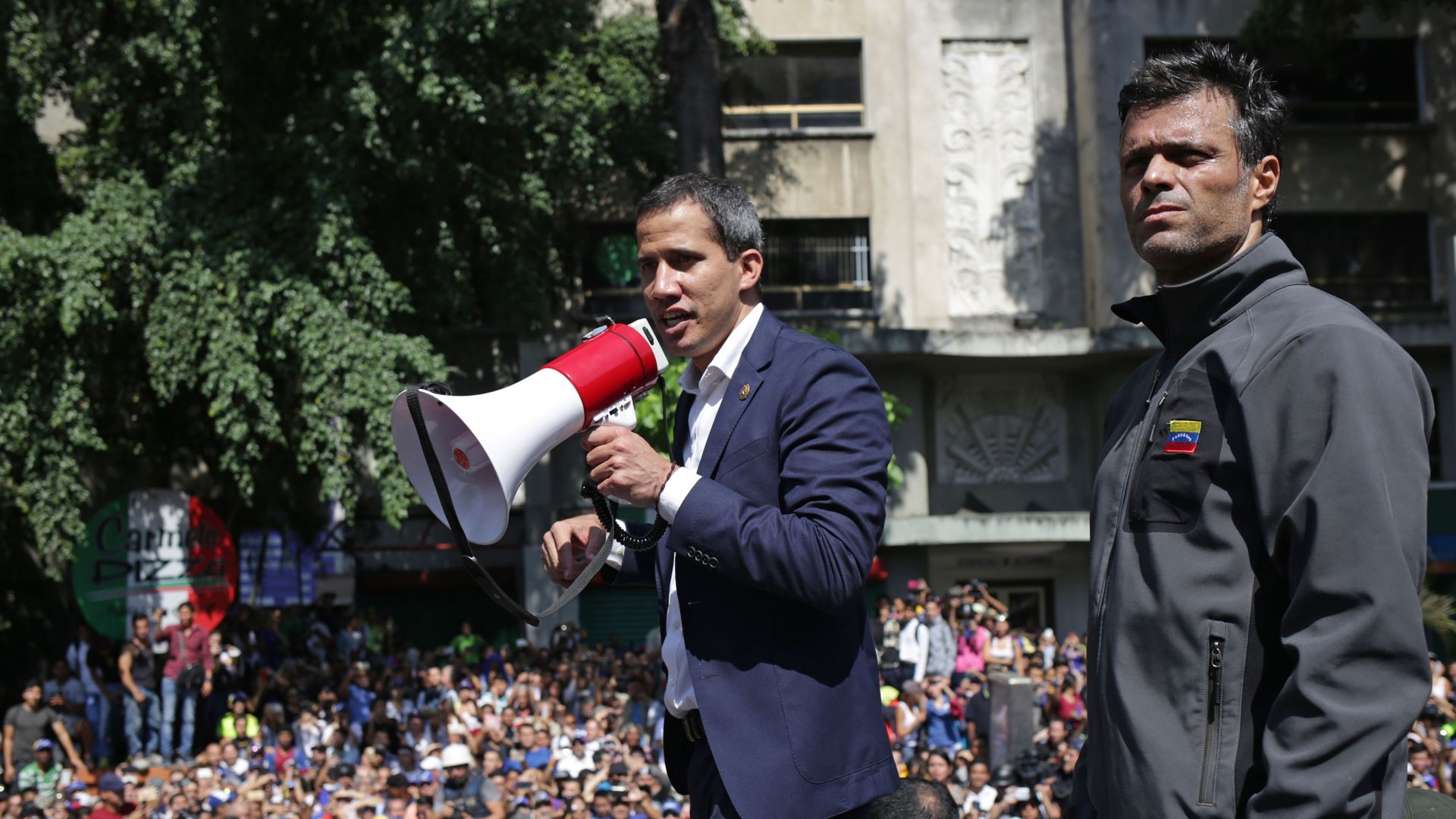 | | | Leopoldo López (right) stands alongside Juan Guaidó in Caracas. Photo: Cristian Hernandez/AFP via Getty | | | | "We spoke to everybody and we never received a no from anybody," a source who was coordinating between the opposition and the regime ahead of April 30 tells Axios. - "Everybody" included the heads of the supreme court and armed forces — Maikel Moreno and Vladimir Padrino, respectively — and others in Maduro's inner circle.
- They had been offered protections if Maduro lost power, and all seemed willing to play their part — or at least to jump ship when Maduro's fall was imminent.
The first domino fell when the head of the secret police, Christopher Figuera, facilitated López's escape from house arrest. - Moreno was to move next, declaring Maduro illegitimate and elevating the National Assembly. Padrino would then publicly align the military with the supreme court's decision.
- The public and the rank-and-file military, among whom Maduro was widely loathed, would rally behind Guaidó. The vise would close fast enough that he'd have no way out.
- The era of two presidents — which began in January with a declaration that Maduro was a "usurper" and National Assembly President Guaidó the legitimate leader — would be over.
|     | | | | | | Part III: The unraveling | 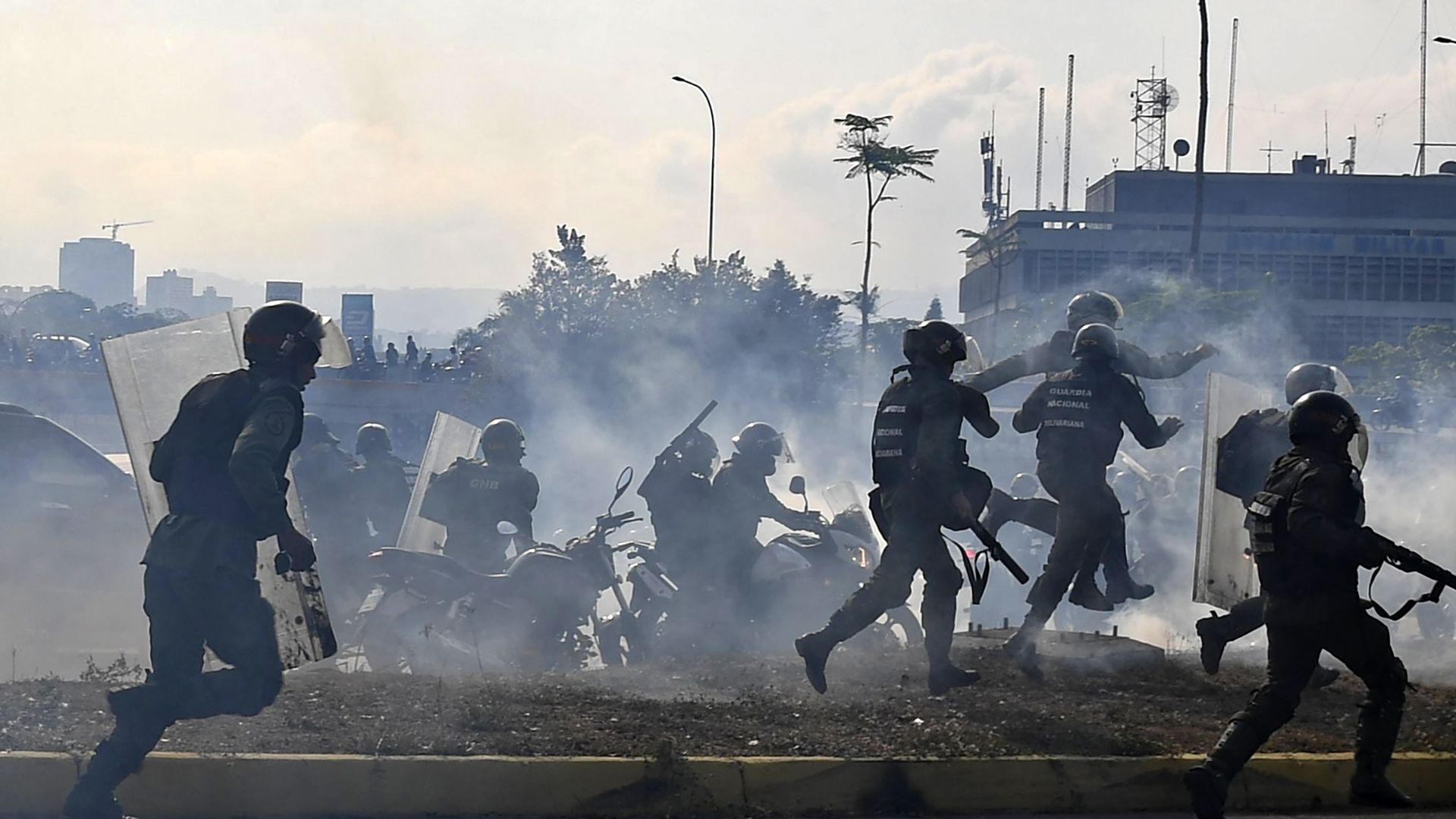 | | | National Guard troops loyal to Nicolás Maduro arrive on the scene. Photo: Yuri Cortez/AFP via Getty | | | | "Time works against you with something like this," Santos says. - "After four or five hours when nothing had happened, I said, 'Uh oh. I think this is not happening.'"
"When I was outside, near to where I live, the first thing I encountered was an officer from the national guard shooting people who were congregating in the street," Sandoval says. - People fled as a "colectivo," or leftist paramilitary group, arrived and began shooting. This all took place right outside of a police station.
- "The first thing you think of is, 'Wait, Juan Guaidó said that there was something developing, some events were taking place, so how is it that the police don't know what to do?' ... You realize that this is just the same old story as always."
"When it began to look grim was when we heard that Maduro had been taken to Fort Tiuna and the Russians and the Cubans were there and they were digging in," Bolton reflects. "They weren't going to let him go, that's for sure." - In the early afternoon, by which time the situation had "taken a dip downhill," Bolton emerged in front of the White House and shocked the international media by declaring that Padrino, Moreno and Iván Hernández Dala, the head of the presidential guard, had all conspired against Maduro.
- "I just wanted everybody to be sure that we knew what was going on. That we knew that people in the Maduro regime had been part of this plot," Bolton says.
Four protesters were killed and more than 200 injured. "By noon, I knew this is just another episode of a long novel that still has no end. We don't know when it will end, maybe I'll die and miss the ending." — Carlos Sandoval, writer and literature professor |     | | | | | | A message from Blockchain.com | | Worried you missed the boat on Bitcoin? It's not too late | | | 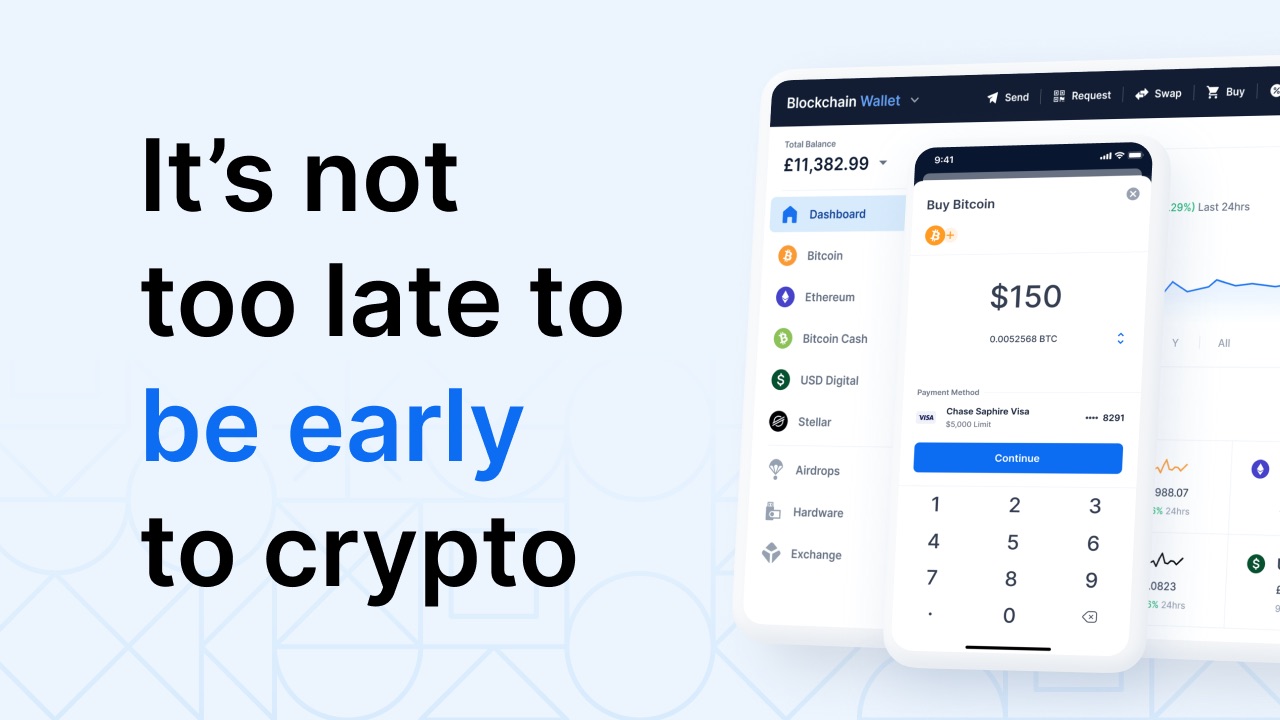 | | | | Blockchain.com allows you to buy, sell, trade, swap and earn cryptocurrencies like Bitcoin. The background: With over 70M Wallets in 200 countries, Blockchain.com is trusted by millions of people to trade, store and use crypto. So, what are you waiting for? | | | | | | Part IV: What went wrong | 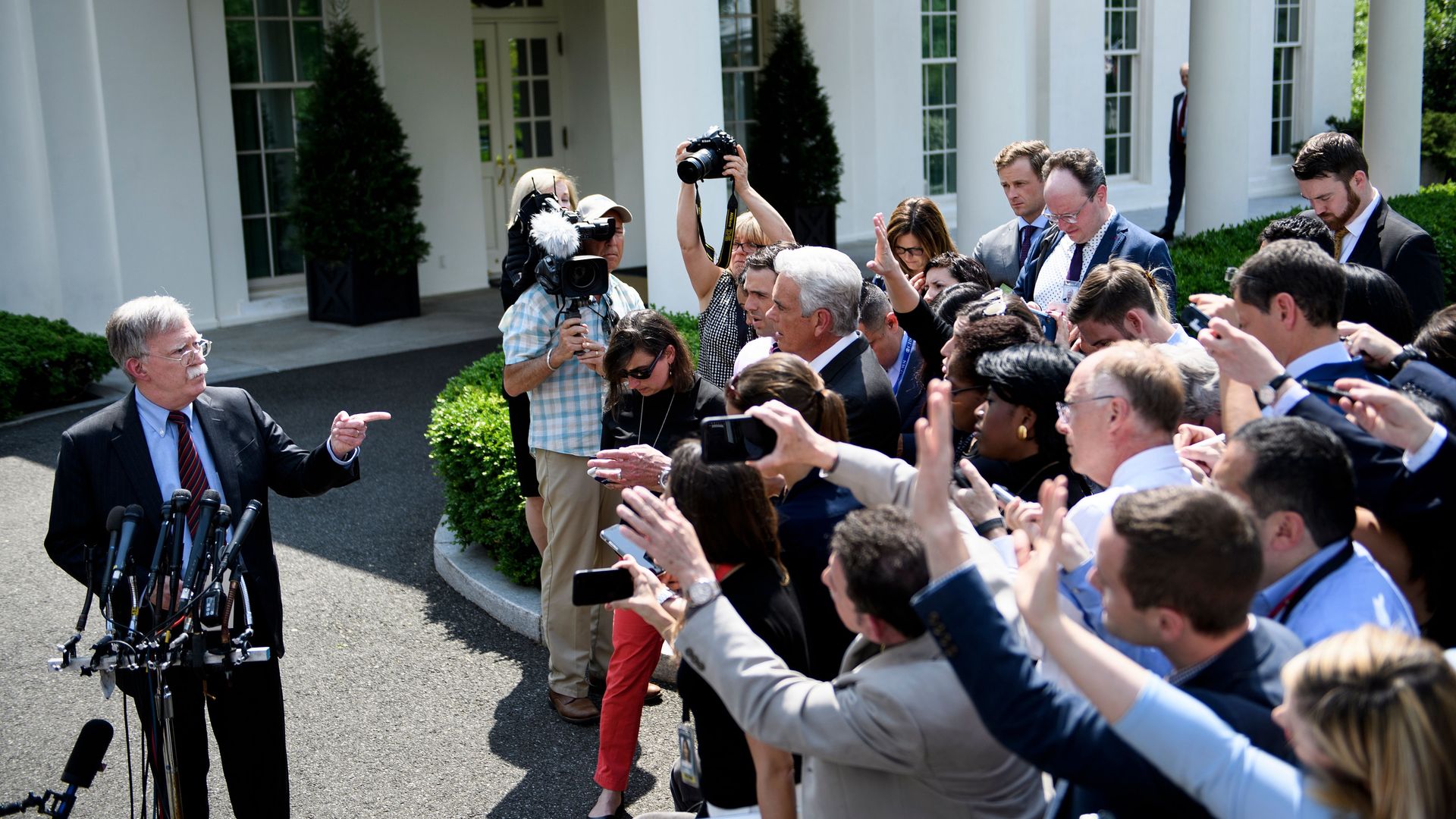 | | | National security adviser John Bolton briefs the press. Photo: Brendan Smialowski/AFP via Getty | | | | The regime insiders never fully trusted the opposition's promises, the military was only ever going to side with the winning team, and "Maduro kept his cool," the source who was coordinating between the sides says. - If he had fired the military chiefs who plotted behind his back, the source says, the military could have turned on him. Instead, he assured them of his loyalty.
- One by one, the regime's top figures took their places alongside Maduro. The following morning, Padrino was on state TV, smiling alongside his commander-in-chief.
"We came very close," Guaidó says, asked by Axios to reflect on April 30. "And we are very close to achieving a transition." - "The most important element of what April 30 represents," he said last week at the Hudson Institute, is that the military will play a central role in any transition.
Even those close to the effort to oust Maduro remain unsure whether the would-be turncoats double-crossed them, hedged their bets, or simply got cold feet. - "We underestimated the capability of Maduro to penetrate information and things like that," Santos says. In Vecchio's view, the opposition "underestimated the real nature of the regime ... the criminal organization in power."
Bolton, in part, blames Trump. He says the president was ready to rally behind Guaidó one moment and abandon him the next — to the extent that Bolton felt Maduro's overthrow had to be accomplished quickly, before Trump abandoned the cause entirely. - "I think it unquestionably hurt the chances of success," Bolton says. And after April 30 failed, Trump "didn't want anything to do with it."
|     | | | | | | Part V: The aftermath | 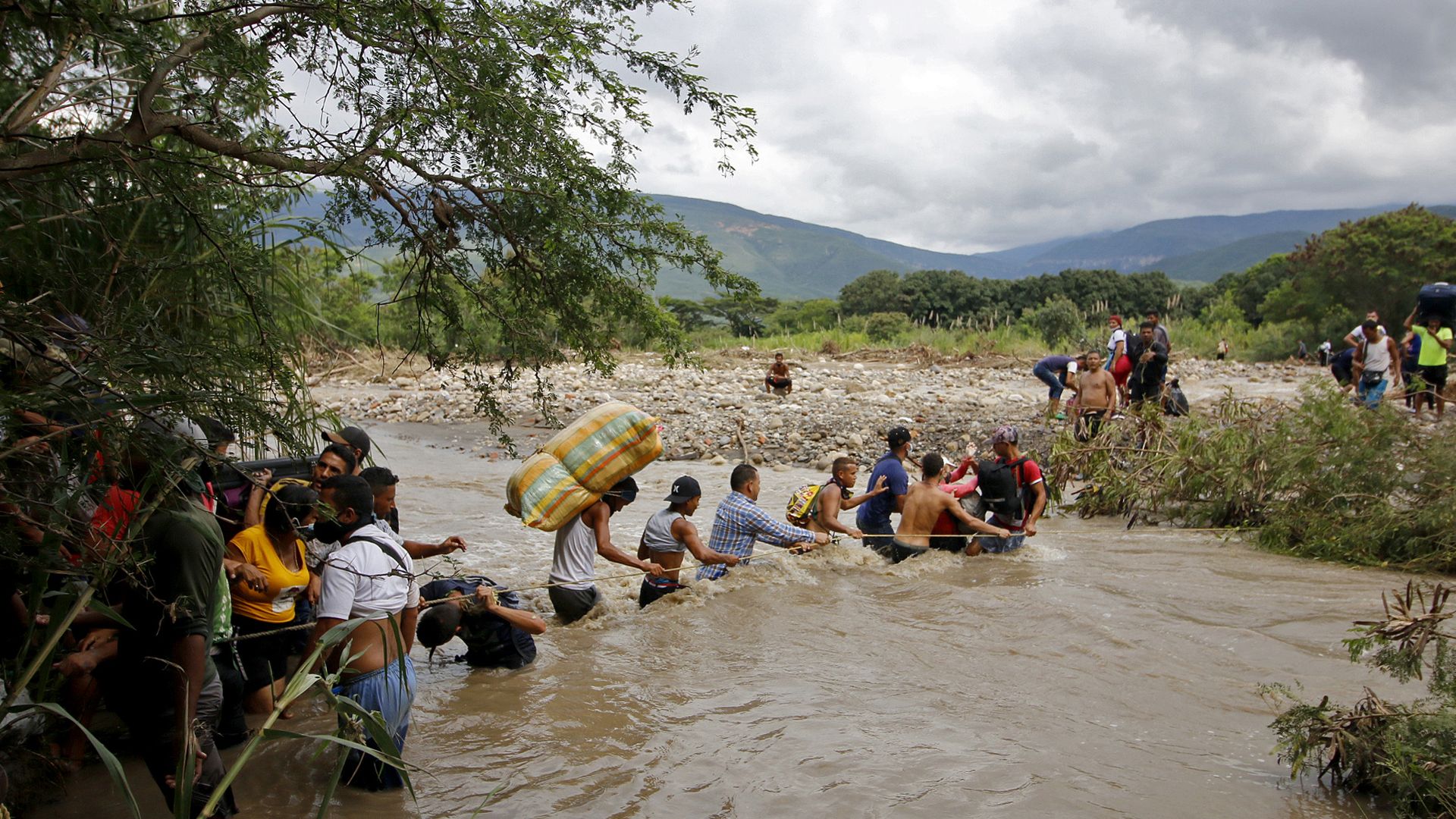 | | | Venezuelans cross into Colombia. Photo: Schneyder Mendoza/AFP via Getty | | | | "From that day on, I felt cheated," Sandoval says. - "I felt like I was just another one of the bunch, another Venezuelan that wrongly believed in the opposition," Sandoval says.
- "Now, for someone to convince me to go to a march, to listen to some politician, it's almost impossible. You can't even pay me to do that because I don't believe in anything anymore."
The suffering in Venezuela intensified in the months after April 30, even as the eyes of the world largely moved on. - The migrant crisis has accelerated. Five million Venezuelans now live outside the country, around 2 million of them across the border in Colombia. "The musicality of Bogotá has changed," Santos says, because of the number of Venezuelan accents.
- By one estimate, 96% of those who remain in the country are living in poverty.
"I think after April 30, Venezuelans became lethargic, and this feeling doesn't seem to have an ending date," Sandoval says. - "We're living in a situation that, with inflation, with the pandemic, with quarantine, the situation has gotten much more difficult because we are trying not to die from COVID or trying not to die of hunger."
|     | | | | | | Part VI: What now? | 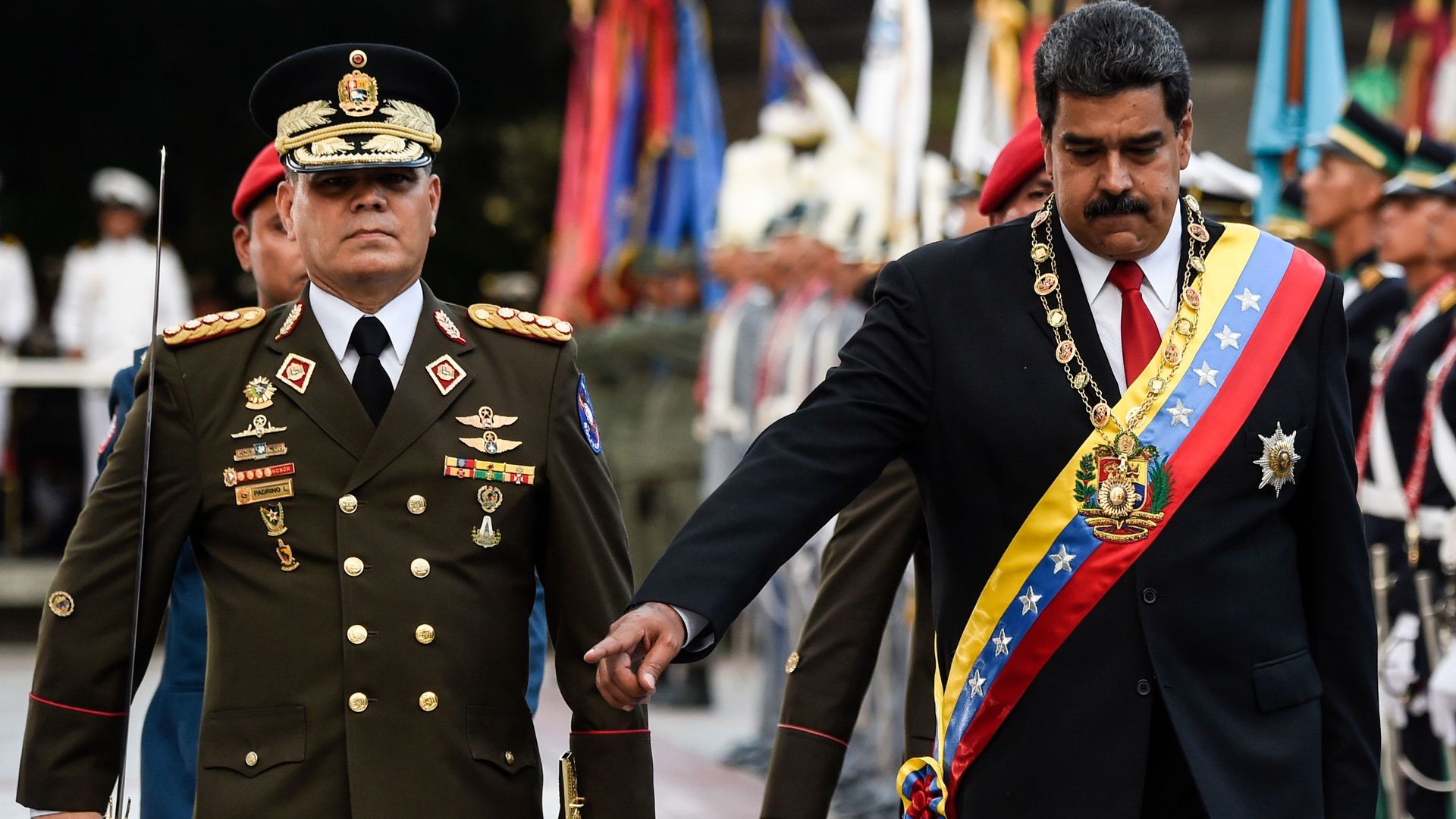 | | | Nicolás Maduro alongside Vladimir Padrino at his inauguration. Photo: Juan Barreto/AFP via Getty | | | | Guaidó is trying to keep the fight alive and regenerate the internal momentum and global attention that was so palpable two years ago. - "We created a crack inside of the regime, and Maduro knows that," Vecchio says. "He cannot trust the people that are surrounding him. And any time again we will be able to open that door for a change in Venezuela."
- That is, he says, if the opposition remains united, and the U.S. and its allies coordinate an effective strategy to pressure Maduro while also providing humanitarian aid.
The Biden administration's attention has thus far been elsewhere — the pandemic, China, Russia, the Iran deal. A Venezuela policy review is in progress. - The administration continues to recognize Guaidó and to refer to Maduro as a "dictator."
- A spokesman for State Department's Bureau of Western Hemisphere Affairs told me the U.S. would work to help "bring the humanitarian crises in Venezuela to an end through practical and effective international cooperation," while also combatting "the transnational crime and criminal networks emanating from Venezuela."
"I don't think things will change politically soon. I don't see it," Sandoval says. - "As an optimist though, I will keep working, I will continue to help my students. They can't leave the country but they can try to find their way."
- "I hope my optimism finds a way."
|     | | | | | | 7. Stories we're watching | 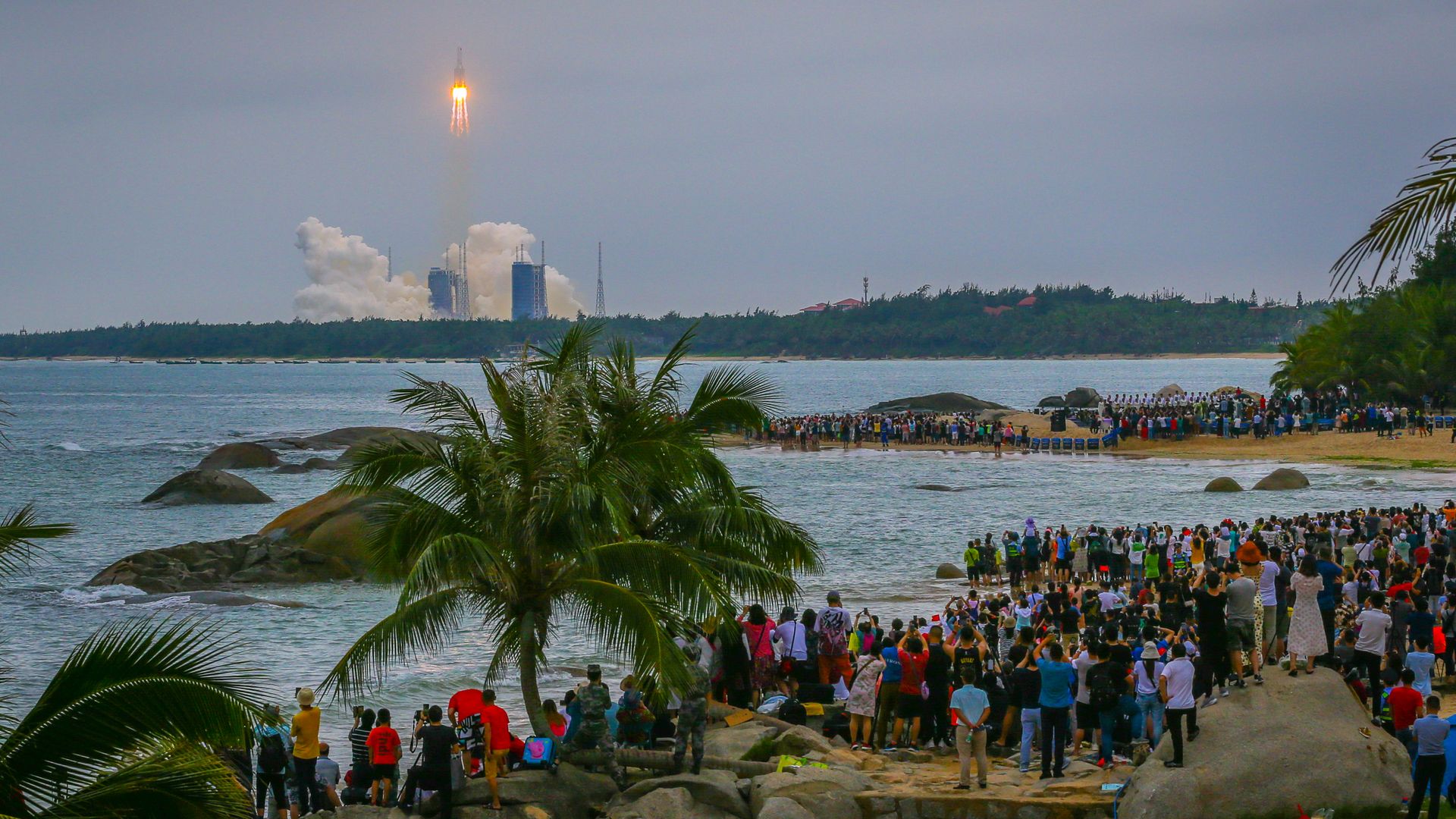 | | | Watching a rocket take off for the space station, in Wenchang, China. Photo: Zhang Mao/VCG via Getty | | | - What key senators want from Biden-Putin summit
- India's crisis gets worse; U.S. sends $100m in aid
- Vaccines: EU leads on passports, Brazil rejects Sputnik; Novavax is coming
- Palestinian elections to be delayed
- Boris Johnson investigated over apartment renovation
- Bolsonaro investigated over pandemic response
- In Biden's first 100 days, views of U.S. rise — except in China
Quoted: "I was taken to a bathhouse yesterday ... there was a mirror there. I looked at myself — I am just a horrible skeleton." — Alexei Navalny today in court |     | | | | | | A message from Blockchain.com | | Worried you missed the boat on Bitcoin? It's not too late | | |  | | | | Blockchain.com allows you to buy, sell, trade, swap and earn cryptocurrencies like Bitcoin. The background: With over 70M Wallets in 200 countries, Blockchain.com is trusted by millions of people to trade, store and use crypto. So, what are you waiting for? | | | | | | Axios thanks our partners for supporting our newsletters.
Sponsorship has no influence on editorial content. Axios, 3100 Clarendon Blvd, Suite 1300, Arlington VA 22201 | | | You received this email because you signed up for newsletters from Axios.
Change your preferences or unsubscribe here. | | | Was this email forwarded to you?
Sign up now to get Axios in your inbox. | | | | Follow Axios on social media:    | | | | | |











No comments:
Post a Comment